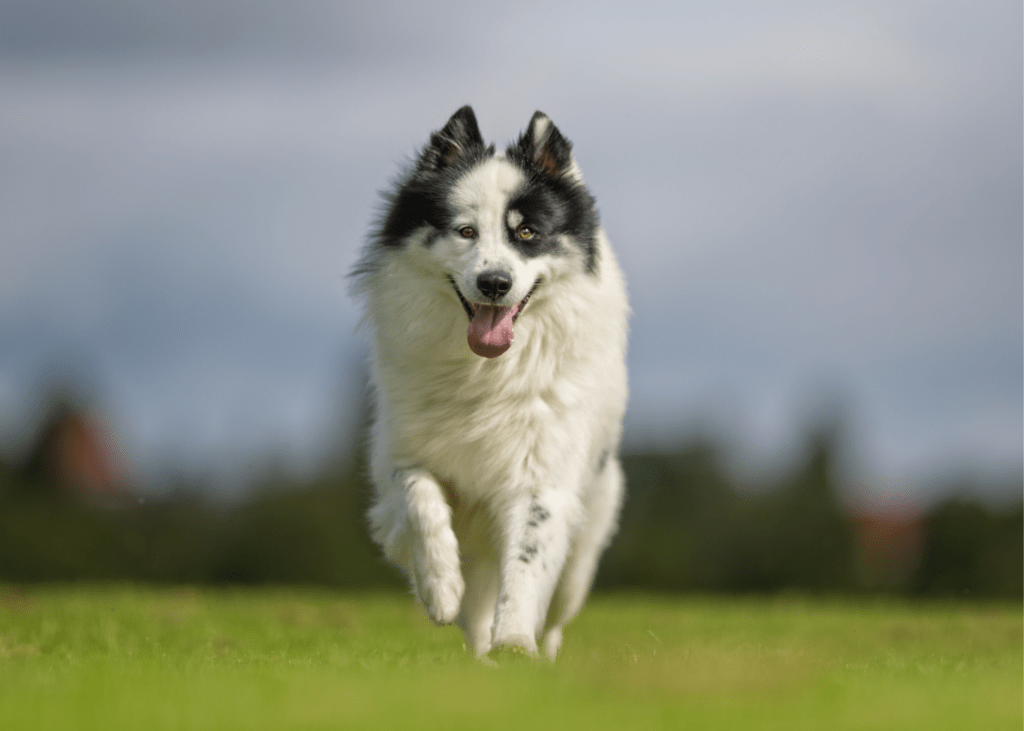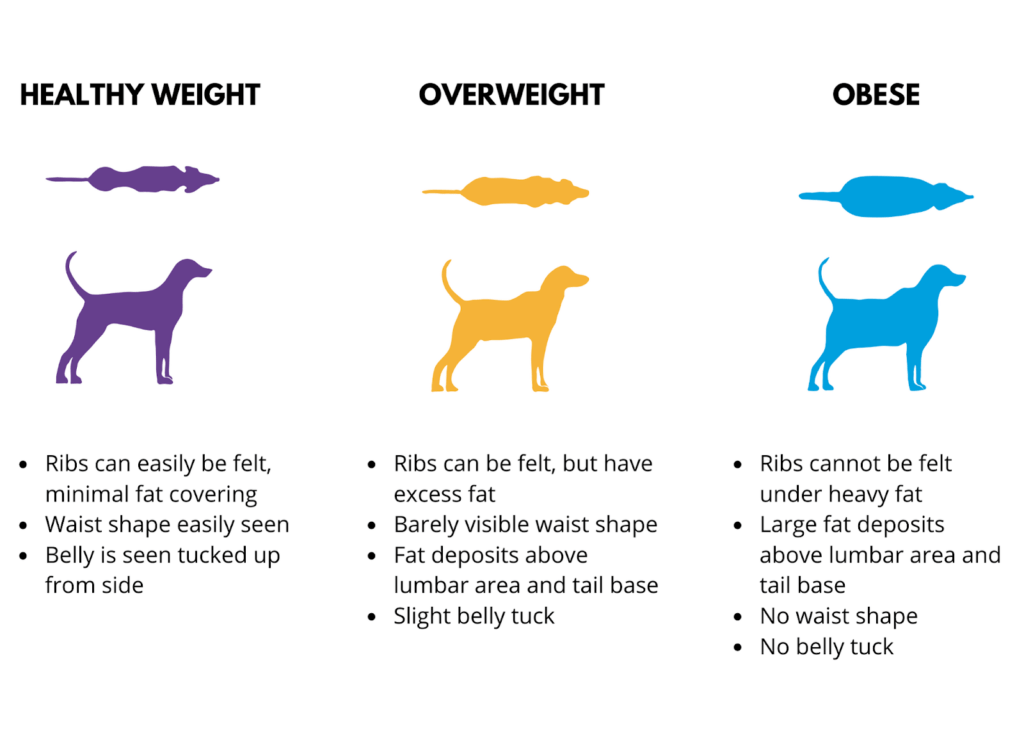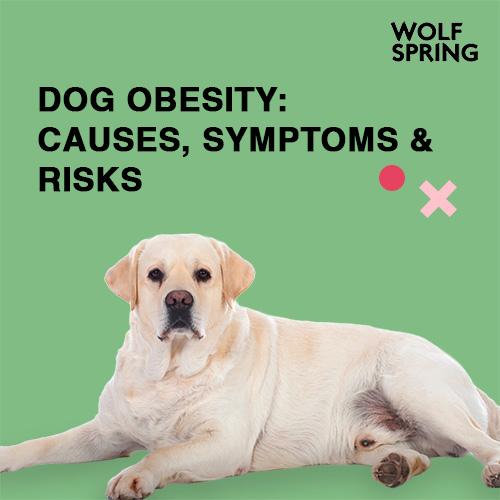Understanding Dog Obesity
Dog obesity is a serious problem dog’s today are facing. Over 50% of dogs in the US are considered overweight. Obesity in dogs can pose a lot of health risks and even an earlier death. In this article, we’ll discuss why dogs can become overweight and how pet parents can overcome this issue.

Symptoms of Dog Obesity
Besides looks, obesity can have many symptoms that you might be able to tell that your dog is overweight or obese.
- Weight gain
- Excess body fat
- Inability (or unwillingness) to exercise
- High body condition score
Causes of Dog Obesity
The following factors can promote dog obesity:
Lifestyle
Overfeeding – This can be from free-feeding kibbles or pouring too much at meal times. You can also overfeed by feeding a food with too many calories for your dog. Table scraps, high fat foods, and too many treats and bones are also a contributing factor of overfeeding.
Lack of exercise – Not enough exercise can also contribute to extra pounds. Dogs who don’t get at least 30 minutes of activity daily run the risk of consuming more calories than they expend.
Not seeing the dog as overweight – Owner does not recognize obesity as being present. Some pet parents do not know the breed standard and will not recognize obesity.
Age and Genetics
Age – As dogs age, they have the energy to participate in less activity and their metabolism also slows down, burning less calories.
Genetic predisposition – Breeds – Some breeds are obesity prone, like terrier breeds, spaniels, dachshunds, beagles and Labrador retrievers.
Spay / Neutering Surgery
Decrease in production of sex hormones decreases energy expenditure and can cause changes in how satisfied a dog is from eating and may make him or her feel hungrier.
Medications
Some medications can slow the metabolism of dogs or increase their appetite – either of which can cause them to store the excess calories they ingest as fat.
Diseases
Some diseases can lead to weight gain like diabetes, cushing’s disease, or hypothyroidism.

How Do I Know If My Dog is Overweight?
There are simple dog obesity charts to help! You can conduct a simple at home test to determine if your dog might be overweight! If they fall into the overweight or obese category, our vets recommend pouring Wolf Spring Weight Management.
Body Composition Chart

Risks of an Overweight Dog
The health risks stemming from obesity are great. Being overweight can cause many challenges and health issues, and even lead to a premature death.
1. Arthritis
The extra weight from an overweight dog puts more pressure on their joints, deteriorating it in the process, leading to arthritis.
2. ACL Tears
Overweight dogs have a significantly higher risk of tearing their ACL, a ligament in their knee that requires surgery to be repaired.
3. Heart and breathing conditions
Dogs who are overweight can suffer from heart disease and high blood pressure. Overweight dogs also tend to have breathing issues and are more prone to being affected by a collapsed trachea and laryngeal paralysis, which both can be fatal.
4. Anesthesia risk
Being put under anesthesia has a much higher risk for overweight dogs, because breathing is challenged by the difficulty expanding their chest.
5. Tumors
The risk of cancers and tumors is higher in overweight dogs.
6. Skin diseases
Irritation and infection by bacteria, leading to itching, odor, and redness, is more common in overweight dogs because of the excess skin folds.
7. Quantity and quality of life
Obesity can take up to 2 years off the life of your dog! Overweight dogs also have a lowered quality of life as they are unable to keep up and participate in the fun activities a dog’s life has to offer.

Weight Loss Tips for Dogs
Good news, dog weight loss doesn’t need to be hard! There are simple steps pet parents can take to help their dog lose weight. First, we recommend finding out what in your dog’s diet is causing weight gain – it could be your dog’s food, too many treats and table scraps, or even not enough exercise. There are many weight loss foods on the market today which have reduced calories to help keep dogs full while promoting weight loss. Exercise also plays a huge role in dog weight loss! You and your dog should aim for at least 30 minutes of exercise daily. Walking, swimming, and playtime activities like fetch, are a great way to burn calories.
Furthermore, there are supplements on the market that can aid in dog weight loss, without having to change your dog’s favorite food. Wolf Spring’s natural ingredient Weight Management formula has ingredients that promote weight loss by supporting fat burn, boosting the metabolism, and fostering good digestive health. With this new way to lose weight, pet parents can keep feeding their dogs food they know they enjoy, while losing weight.
Conclusion: How Obesity Affects your Dog
The most serious effect of obesity is the potential to shave off years of a dog’s life. According to research provided by Banfield Pet Hospital, being 10% overweight can decrease a dog’s lifespan by up to 2.5 years, on average! On top of that, a fat dog can develop other dangerous health issues like diabetes, hypertension, heart disease, joint issues, and increased cancer risk.
Overweight dogs also have a lowered quality of life as they are unable to keep up and participate in the fun activities a dog’s life has to offer.
